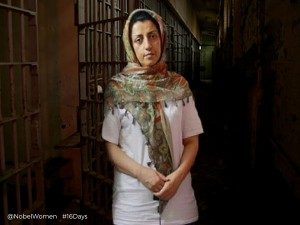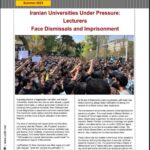
Date: 6 July 2016
URGENT ACTION
Iranian human rights defender on hunger strike
Iranian human rights defender Narges Mohammadi, a prisoner of conscience, has been on hunger strike since 27 June in protest at the authorities’ persistent refusal to allow her to speak with her young children. As she suffers from several medical conditions and takes numerous medicines, the hunger strike critically endangers her health and life.
Iranian human rights defender Narges Mohammadi, a prisoner of conscience, started a hunger strike on 27 June as a last resort to protest the judicial authorities’ persistent refusal to allow her telephone contact with her nine-year-old twins. Her children had to move abroad one year ago to live with their father, as there was nobody to look after them in Iran after her arrest in May 2015. Since then, she has been allowed only one phone call with them. In a letter she wrote from inside Evin Prison on 27 June announcing her hunger strike, she said that all her requests for telephone contact with her children have been refused, except on 2 April when, on the written order of the Prosecutor General of Tehran, she was granted a 10-minute telephone call with them. She wrote: “I have forgotten their voices. I don’t keep their photos by my bed anymore. I can’t look at them… [The authorities] have regarded me being a human rights defender as a crime but more painful than that is that they have also denied my womanhood and motherhood. Until the day I die and fall silent, I will continue protesting and I will never forget.” Earlier in February 2016, Narges Mohammadi had written another open letter, this time to the Head of the Judiciary expressing concern that the authorities were denying her telephone contact with her children to further punish her.
Narges Mohammadi is critically ill. She suffers from a pulmonary embolism (a blockage in the blood vessel that carries blood from the heart to the lungs) and a neurological disorder that has resulted in her experiencing seizures and temporary partial paralysis. She needs ongoing specialized medical care, which she cannot receive in prison, as well as daily medication, and a hunger strike puts her health and life at risk. On 3 July, she was taken from Tehran’s Evin Prison to Iran Mehr Hospital, also in Tehran, for routine tests related to her pulmonary embolism.
Narges Mohammadi received a 16-year prison sentence after she was convicted, following an unfair trial in April 2016, of the charges of “founding an illegal group”, “gathering and colluding to commit crimes against national security”, and “spreading propaganda against the system”. She is already serving a six-year prison sentence from a previous case. Her convictions are based solely on her human rights work.
Please write immediately in Persian, English, Arabic, French, Spanish or your own language:
-Calling on the Iranian authorities to release Narges Mohammadi immediately and unconditionally, as she is a prisoner of conscience, held solely for her peaceful human rights work;
-Urging them to allow her regular visits and phone calls from her family, including her children, as well as contact with a lawyer of her own choosing;
-Urging them to ensure that, pending her release, she is provided with adequate health care outside prison, and has ongoing access to a qualified health professional to provide health care in compliance with medical ethics, including the principles of confidentiality, autonomy, and informed consent.
PLEASE SEND APPEALS BEFORE 17 AUGUST 2016 TO:
Head of the Judiciary
Ayatollah Sadegh Larijani
Salutation: Your Excellency
Head of the Judiciary
Ayatollah Sadegh Larijani
Salutation: Your Excellency
And copies to:
Prosecutor General of Tehran
Abbas Ja’fari Dolat Abadi Also send copies to diplomatic representatives accredited to your country. Please insert local diplomatic addresses below:
Additional Information
In her 27 June 2016 letter, Narges Mohammadi details the reason for her hunger strike:
“One year ago, in this month, my two young children left the country to join their father in France because it was no longer possible for them to live without their parents. I have gone through our last meeting a hundred times. I cannot remember how much I cried… I requested permission to use the telephone to at least be able to hear their voices but it was not granted… The day of my children’s birthday arrived, so I made a request to speak with them by phone to wish them happy birthday. It was refused. In the women’s section of Evin Prison… there is no phone for contacting families and making phone calls is forbidden. Visitation between mothers and children takes place once a week through face-to-face visits. When [my cellmates] are called up every Wednesday to go meet their children… I meet with my dearest Kiana and Ali in my daydreams. I smell their small hands and kiss their beautiful faces… My only way of contact with my children is through our dreams…
Not only have my imprisonment and my recent 16-year sentence not made me feel any regret, they have actually strengthened my convictions and commitment to defending human rights more than ever before. However, nothing can reduce the pain and suffering that results from my separation from my beloved children… I have always said that, in a land where [each of] being a woman, being a mother and being a human rights defender is difficult on their own, being all three is an unforgivable crime… and here I am, in my own homeland, convicted and imprisoned for the crime of being a human rights defender, a feminist and an opponent of the death penalty…
My children were only three years old when [the authorities] raided my house in the middle of the night and snatched my dear Kiana from my arms and threw me into a cell. My loved ones were five years old and their father had left the country when they came for me again. My children would not let me go so [the authorities] lied to them and said that I would be back home that night and, on 5 May last year, [the authorities] left my children who were coming home after school and hoping to see their mother at home, hopeless in front of a closed door [at home]. Now I am asking these pious men governing the country, ‘Is [the pain] already inflicted against me and my children not enough, that they now torment my small and innocent children like this?’ I patiently waited a year and nothing happened. Despite my reluctance and poor physical condition, there is no way left for me other than to stage a hunger strike to make my cry that ‘I am a mother’ and ‘I miss my children’ be heard… I have no request other than to be able to have contact with my children on the telephone. If my request is too great, unreasonable, immoral, unlawful and against national security, then tell me. If a mother who is considered a criminal in the eyes of the authorities must be denied the right to speak to her children, then announce it, otherwise let this mother hear the voices of her children.”
Article 9 (3) of the Convention on the Rights of the Child, to which Iran is a state party, stipulates that states must respect the right of the child who is separated from one or both parents to maintain personal relations and direct contact with them on a regular basis, except if it is contrary to the child’s best interests. The UN Rules for the Treatment of Women Prisoners and Non-custodial Measures for Women Offenders (the Bangkok Rules) call upon states to give attention to the impact of parental detention and imprisonment on children and, in particular, to identify and promote good practices in relation to the needs and physical, emotional, social and psychological development of children affected by parental detention and imprisonment.













 Posted in
Posted in 











